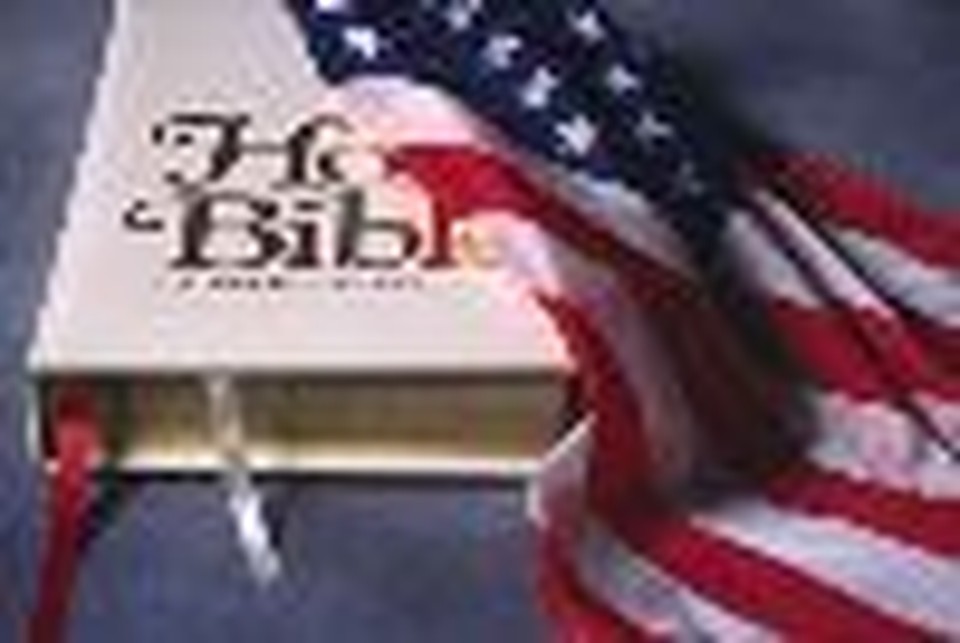Exalting God in the Public Square

Questions concerning church and state and the Christian's role in the political process regularly come my way. These questions come in part because I often sound very different from the typical neo-con (I do not use that term in a pejorative way but only as a descriptor of most contemporary Christians and the extent of their political thinking).
Christians often wrap the gospel in the American flag and in so doing confuse not only the nation and the church but also our allegiance to Christ and His gospel with our allegiance to America and our rights.
Christians ought to want Christ acknowledged in every sphere. More than that, they should want Christ embraced in every sphere, for simple acknowledgement of God in every sphere falls far short of what God desires or deserves. He desires worship, not lip service. At the same time, Hell is filled with people who acknowledged God prior to their arrival. Christ is to be exalted, not merely acknowledged.
This dynamic is precisely the issue William Stuntz addresses with regard to public displays of the Ten Commandments and similar God acknowledgements. He notes, "That might be tolerable if the monuments and manger scenes satisfied some religious duty. If anything, though, duty cuts the other way.
Lukewarm?
There is a passage in the book of Revelations [sic] that bears on this point. The risen Jesus is speaking of, and to, the church in Laodicea. He tells them: "I know your deeds, that you are neither cold nor hot. I wish you were either one or the other! So, because you are lukewarm – neither hot nor cold –I am about to spit you out of my mouth."
Symbolic acknowledgments like the Texas monument and the Kentucky plaques, like religious mottoes on money or public manger scenes (usually accompanied by Santa and his reindeer), are quintessentially lukewarm. They do not so much honor God as try to buy him off, cheap. This was precisely the problem with most mandatory school prayers in the days when such things were allowed. The prayers were so vapid as to insult believers, yet still managed to offend non-believers. Just like baby Jesus with a stable full of reindeer."
Now I have no problem with such public displays. I even desire them. However, the point is well made. Indeed a tip of the hat to God ought to grieve the Christian's heart beyond measure. How dare we engage in policies that will allow the glorious Name of our God to be turned into nothing more than a dead symbol of an ancient moral code?
At the same time, it is not in keeping with the gospel to legislate Christianity as it not only fosters the lukewarmness mentioned above, but a dead Pharisaic mentality that keeps persons comfortable in their self-righteousness, sin, and separation from God.
Moreover, do we really think we can win the culture war through political strong arming and public policy imposition? Do we really think the assertion of our rights, particularly through coercive tactics is in keeping with the gospel message and gospel methodology, or will in any way help us to win those who hate us from the outset? Won't it cause them to hate us even more? Are we fighting for our rights or are we fighting for souls? Didn't the apostle Paul suspend his liberty for the sake of the gospel? Did he not say that he would never eat meat again if that would advance the gospel? Did he not say that he had become all things to all men that by all means he might save some? Wasn't he talking about suspending his rights in that statement?
The Real Question
It seems to me the real question is not whether or not we engage the culture. We must. The real question is how we go about it. What is to be our emphasis: political action or gospel influence in the political arena? The distinction may be lost on some but the chasm between the two dynamics is quite wide. What is to be our attitude, our method, and our goal? These are serious questions with which evangelicals must wrestle.
Are we really to emphasize our rights? I'm not saying we don't speak about them at all. Anyone who has read me before knows that I speak about them regularly. But, are we to emphasize them and fight for them to the death as it were? Are we to engage in bombastic, harsh, critical rhetoric for a political cause or are we to speak the truth of the Christian Worldview in love to and in every sphere of life?
Again, Stuntz is helpful here citing the Golden Rule: "The question shouldn't be what I'd rather. It shouldn't be what is or isn't to my side's advantage. If the Golden Rule means anything in this context, the question should be, what is to the other side's advantage? Twenty-first century America is a land full of legal rights, and lawyers to make the most of them. The most Christian thing to do in a place like that is to make the least of them. Somewhere, sometime I'd like to hear that my fellow believers, when given the opportunity to erect some watered-down monument or display, said: "Thank you, but no. I don't want to exercise my rights." That would communicate more Christian faith than all the monuments and plaques and graduation prayers put together."
With that sentiment we can agree. When we talk about bringing the Christian Worldview to bear upon the culture and propagating the same in the market place of ideas, let us speak the truth in love to every issue on the table from religious freedom, to abortion, to Supreme Court justices, to homosexuality, etc .
At the same time, in our attitude, speech, and actions, let us not be more adversarial or offensive than the gospel itself. Let us be more concerned with the salvation of others than we are with our rights.
No doubt one will say, "We are interested in the honor and acknowledgment of God." With that sentiment we can agree as well. But, to that sentiment I say when souls are won, not only will God be acknowledged both in private and in public, He will be exalted in those very same contexts. May God be truly exalted, not merely acknowledged, in the public square.
Dr. Paul J. Dean is an adjunct professor at Erskine Theological Seminary and serves as the Director of Supervised Ministry at the Greenville, SC extension of the Southern Baptist Theological Seminary. He is actively involved in the field of biblical counseling having co-founded the Southern Baptist Association of Biblical Counselors.
Originally published November 08, 2005.





